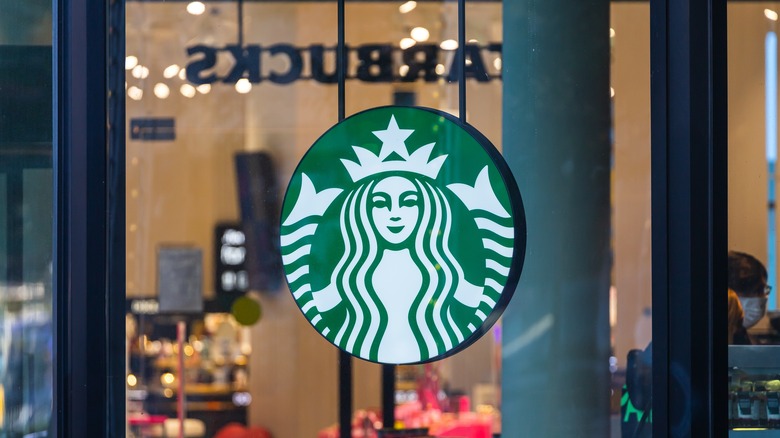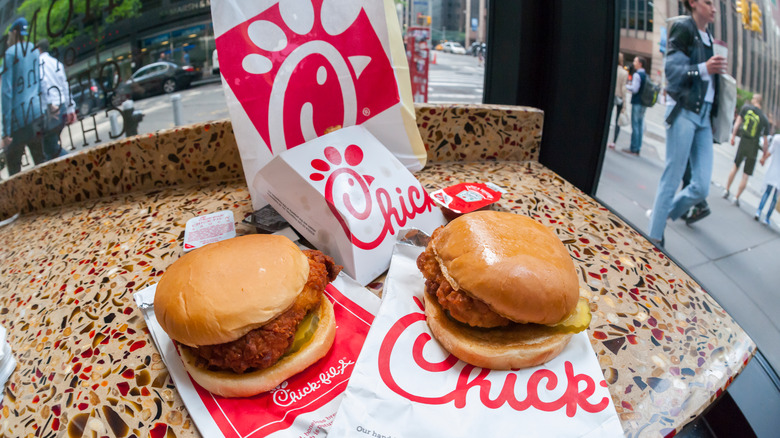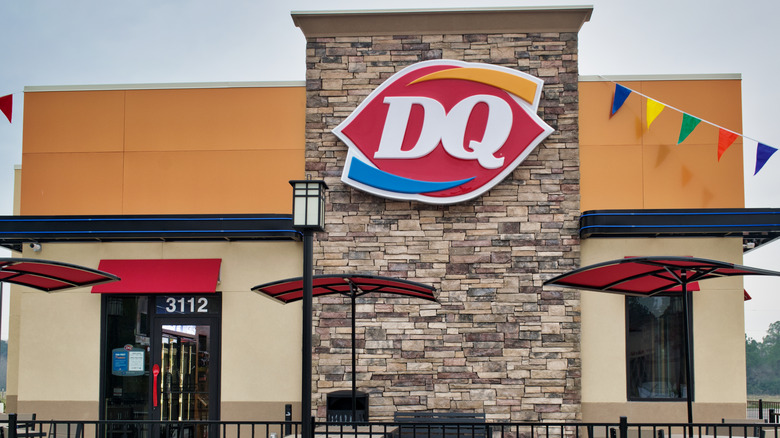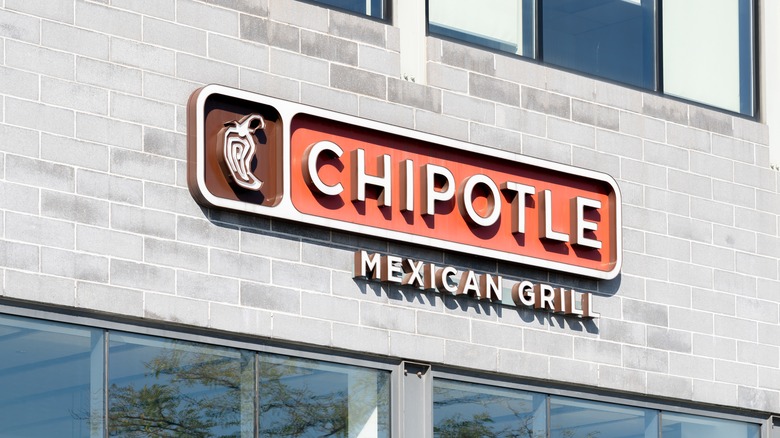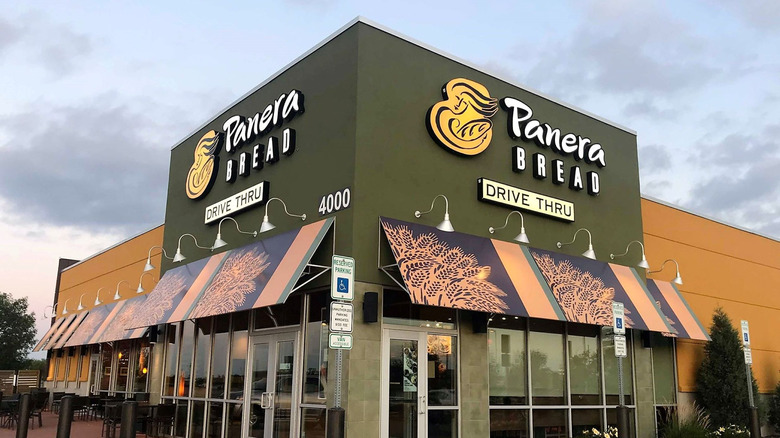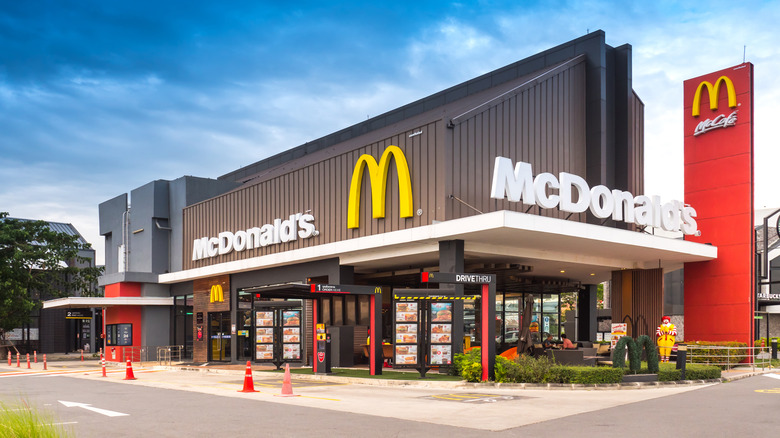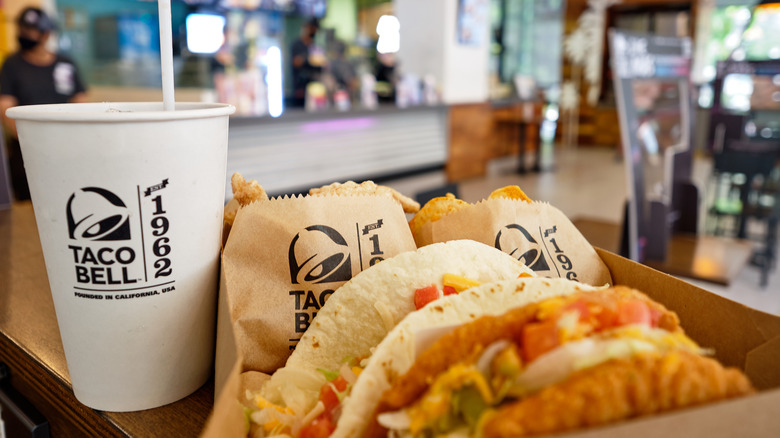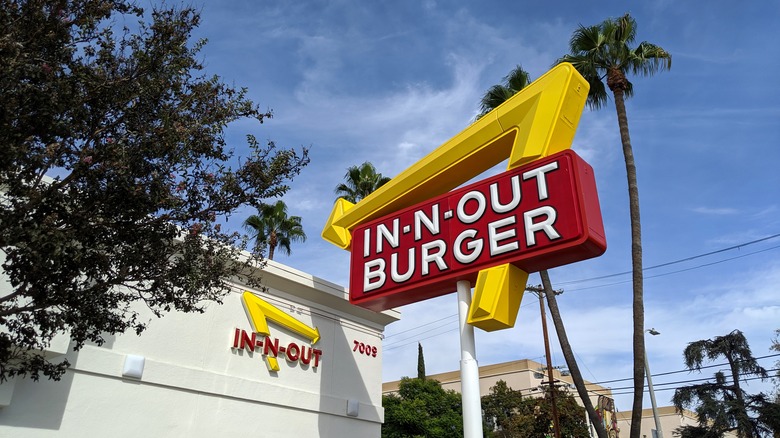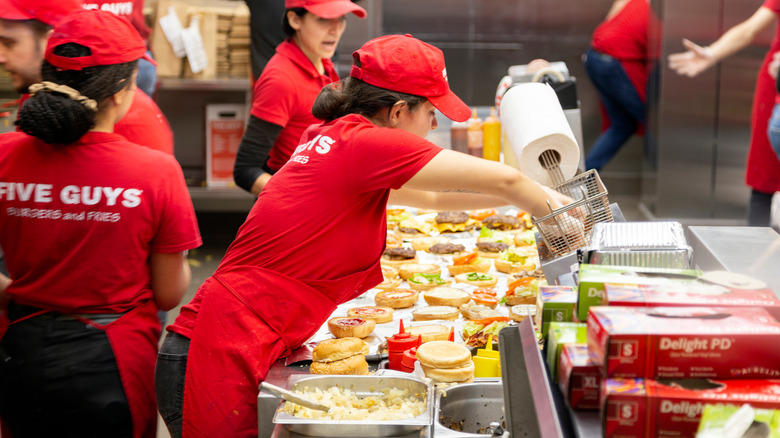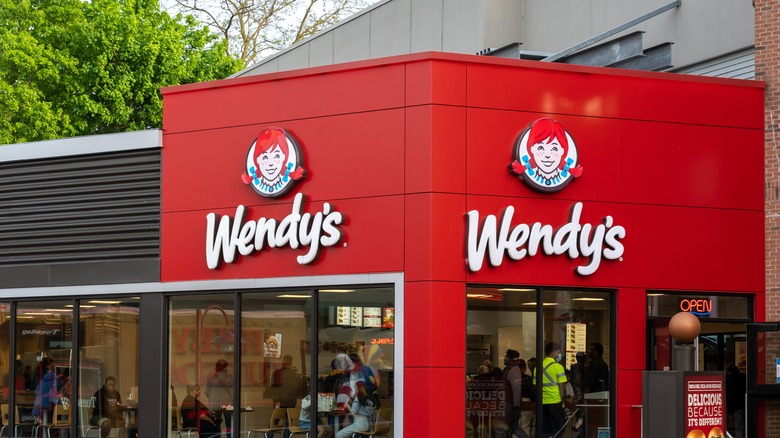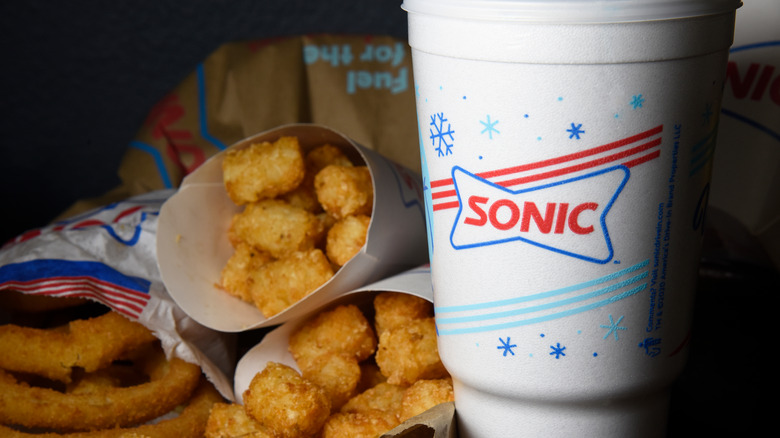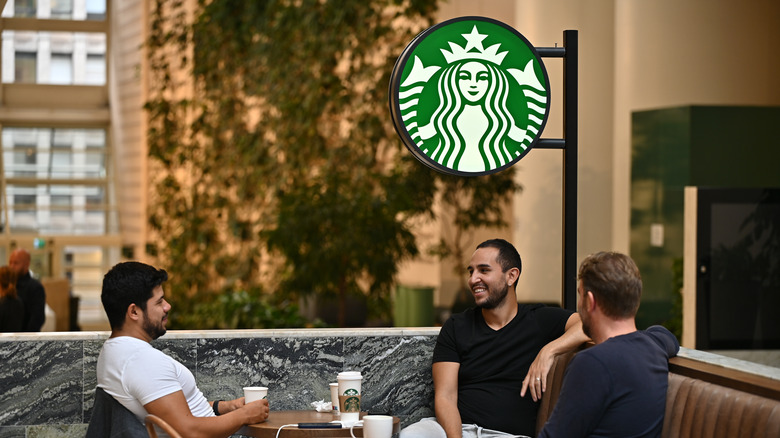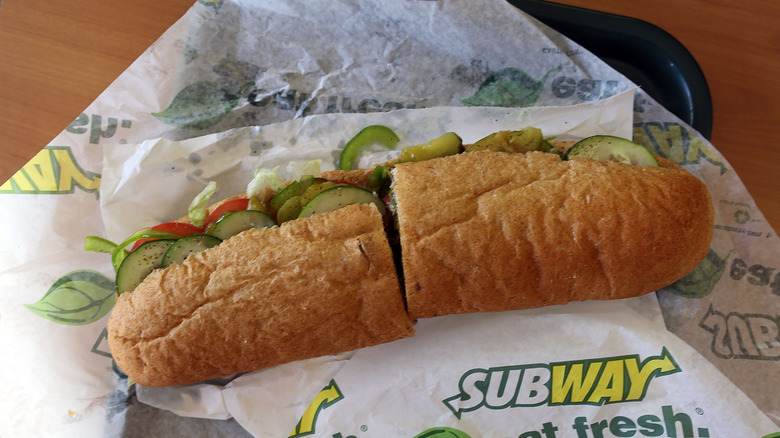11 Fast Food Employee Rules That You Probably Didn't Know About
Working at a fast-food restaurant is a tough job. Often, employees don't make more than minimum wage. They work long hours and are constantly dealing with demanding customers. It's no wonder that employees in the industry report high rates of frustration with their jobs and burnout. One former McDonald's employee told Vox, "My managers kept pushing me to work faster, and while trying to meet their demands, I slipped on a wet floor, catching my arm on a hot grill. The managers told me to put mustard on it." (Uf!)
Of course, this obvious health and safety violation is only one of the negative things about working in fast-food eateries. Often, workers are required to do high-stress, repetitive tasks under close supervision. They also have to follow a strict set of rules when they come to work each day. While some rules are more standard — like wearing a uniform or washing their hands often — others are downright bizarre. These are just a few of our favorite and most interesting (to say the least) fast-food employee rules from all your favorite fast casual restaurants.
Chick-Fil-A workers can't say you're welcome
If you've eaten at a Chick-Fil-A restaurant, you might notice something different about how its workers can interact with customers. While some fast-food restaurants are more famous for their lack of customer service, Chick-Fil-A is known for employees who go above and beyond to make dining experiences great. You'll see this sometimes in small ways — like having a dedicated employee walking the floor at each location to serve dine-in customers. This person can bring over extra sauces and offer refills, so the customer doesn't have to get up from the table.
Yet the most famous thing about customer service is that employees are not allowed to say, "You're welcome." Instead, when a customer says, "Thank you," employees must respond with: "It's my pleasure." According to CNN, the phrase got its start in the early 2000s. Founder Truett Cathy stayed at the Ritz-Carlton and he liked that the employees said "my pleasure" as he felt like it elevated hospitality. He wanted his restaurants, even though they were fast-food, to feel the same way. So he introduced the phrase at a shareholder meeting and the rest is history!
Not every Dairy Queen employee has to flip your Blizzard
In Dairy Queen lore, there's an idea that employees have to give you your Blizzard for free if they don't flip it upside down. Although the ice cream place and this fun party trick have been around since the 1940s, Dairy Queen made this protocol official with its "Upside Down or Free" campaign. Blizzards are supposed to be thicker than your typical milkshake. The soft-serve ice cream and delicious candy mix-ins should be frozen solid and not runny at all. To prove this, employees turn each cup briefly upside down before handing it over to the customer. If it were to fall out, well, then it wouldn't be a very good quality Blizzard!
Yet, if your local Dairy Queen doesn't do this, it might not be worth it to try and get the ice cream for free. The corporate office explained that most Dairy Queen locations operate on a franchise model. This means that they are individually owned and operated. The owner of each location can choose whether or not their store is going to participate in a promotion. So, while hundreds of locations still participate in the "Upside Down or Free" campaign, hundreds more might not.
Chipotle employees can't give you just a little more meat for free
Chipotle employees are under pretty strict orders about how much food to put in your burrito bowl. As Chipotle fans know, the price of each item is determined by the meat you choose (or lack thereof). A vegetarian bowl is the least expensive, while carnitas, beef, and chicken are all a little bit more expensive. Diners can choose as many of the free other toppings (excluding guacamole) as they would like. If you feel like the portion of salsa you got was a little stingy, you can always ask for more for no charge. Same with sour cream, cheese, and beans. Yet if you ask for more meat, even just a little bit, be ready to be charged more.
According to former employees, they always have to charge for "double meat." The restaurant states that a standard portion of meat is four ounces. But diners know that it's not exactly measured. This can be frustrating to customers who feel like the scoop of chicken they got this time is smaller than last time. The trick is all in how you word things. You can say, "Is that a full portion of meat? It looks kind of small." Don't say, "Can I have more meat, please?" If you say that then the employee has to charge you more.
Panera Bread employees can only use their store discount occasionally
If you have a favorite fast food place, you might be tempted to get a job there so you can eat your favorite meals at a discount. Unfortunately for those who work at Panera Bread, their employee discount only applies while they're on shift. According to the Panera Bread employee handbook, workers can't eat or drink anything while they are working. Instead, they must be on break. Workers can't help themselves to their discount meal as they leave for their break either. They have to come around the counter and order like a customer. They also cannot be rung up by any old employee: It has to be a manager. The meal on shift isn't free of charge. Instead, 100% of the cost is covered up to $14.00, but then they're full price after that price point.
If you're not working, you can get a 15% discount on food at any restaurant that Panera Bread's parent company, Hamra Enterprises, owns. According to Panera Bread employees, this policy is more generous now. Before, if you were not working, you always had to pay full price. This caused a lot of frustration amongst employees who felt like there should be more benefits.
McDonald's employees can't make their own food
If you work at McDonald's and are feeling hungry during your shift, you could be in a lot of trouble for cooking up your own food. According to the McDonald's Crew Member Handbook, all employees must clock out for their break. If you are working for more than three and a half hours on any given day, you're entitled to one thirty-minute break. This is pretty standard for customer service jobs — though some establishments pay employees for their one meal break, as long as it doesn't exceed an hour.
Once you clock out, if you want to eat some McDonald's food, you have to find a manager. Only managers can ring up employee orders. Employees receive a fairly small discount of up to 50% off of $8 and nothing more. In addition, employees cannot take their employee meal home with them or save the food for later. The handbook clearly states that unless a manager specifically tells you otherwise, all employees must consume the meal on-site and right away. They cannot share it with others, as it's implied that this is an abuse of the employee meal policy.
Taco Bell employees have to weigh your food before serving it
Taco Bell might be a lot more strict with order sizes than any of us could have realized. According to the Taco Bell employee handbook, the chain follows standard food safety practices. Employees are not allowed to work with any foods in the deep fryer without wearing a heat-resistant glove for protection. In addition, if the employee is experiencing any sort of possibly contagious illness (like a cough, runny nose, fever, or diarrhea) they must tell their manager to avoid infecting customers. Employees must also frequently wash their hands.
However, something that seems out of place in a fast-casual restaurant like Taco Bell is its portion control policy. "Everything that comes out of our kitchen is weighed digitally," a former manager told Thrillist. "If the weight is .3oz off what it's supposed to be, we have to throw that item away. When a soft taco goes on the scale, it needs to be 1.6oz. If it varies .3oz, either way, we have to toss it. We all train with a scale, and we have to get used to doling out the ingredients precisely, to make everything the correct weight in the end. It's very hard to get that right."
In-N-Out Burger has controversial uniform requirements
When you work at In-N-Out Burger, there are different uniform requirements for men and women. According to a former employee, only women are allowed to wear the burger chain's famous red hats. Next time you stop in for an order of animal-style fries, take a look around. You'll notice it to be true. While many customer service jobs might be more relaxed about things like tattoos and piercings, In-N-Out Burger is not one of them. Employees expressed just how strict the company is on overall appearance. If you have any visible tattoos, you will not be hired. When you go in for your interview at the chain, your tattoos will need to be hidden under a shirt or expertly covered up with makeup. You can't use bracelets to cover up your tattoos because you aren't allowed to wear any either. Employees can also only wear one ring per hand, presumably for food safety purposes.
In addition to more traditional uniform rules, the fast food chain also came under fire when managers would not allow employees to wear "fight for 15" buttons on their uniforms. The button was to signify support for raising the minimum wage. Since the company required employees to wear other buttons for promotional purposes, the company faced a lawsuit.
Five Guys chefs have to cook burgers without timers
Chefs at the popular burger chain Five Guys need to know more about meat than an average fry cook. According to NBC News, the chain grew quickly. In 2011, Five Guys opened as many as five new locations each week. That growth in popularity meant lots of new employees coming on board. Yet to be hired in their quick-moving kitchens, there was one requirement: You had to be able to cook without a timer. The owners wanted experienced cooks to handle the cornerstone item at their restaurant.
A large group of people can follow instructions to fry up a burger patty, but only those with more kitchen experience know when it's time to serve meat without a reminder. In addition to the "no timer" rule, owners put strict standard operating procedures on just about every other aspect of the restaurant. For example, all chefs must shake each bag of french fries 15 times before serving them and place pickles on top of the burger patty, never below.
Wendy's employees must temper all cheese
If you work at Wendy's there are a lot of rules around making sure the cheese for its cheeseburgers is perfect. According to former employees, the chain stakes its reputation on using "fresh, never frozen" beef patties. This is true, as the patties come refrigerated, not frozen. Employees then fry up the burgers as the orders come in from customers. If you order a cheeseburger, the company uses American cheese to top it off. However, if you put cold cheese directly onto the hot grill, it doesn't cook correctly.
Instead, you need to leave the cheese out for a bit so that it can warm up to at least room temperature. Experienced cooks call this process "tempering," and they do it with a lot of dairy products to preserve freshness and avoid curdling by heating it too quickly. All Wendy's cooks must leave the cheese out for at least an hour — if not longer — before using it on the grill.
Sonic carhops are paid less for not skating
One of the fun things at Sonic is that the carhops often-roller skate your order to your car window. This approach adds to the overall Americana vibe of the classic drive-in restaurant. While it's not an official rule that all carhops must skate to secure the job, there are seemingly substantiated rumors that those who choose not to skate are paid less. According to a former employee, skaters were paid at least .50 an hour more than non-skaters. For a 40-hour work week, that's $1,040 more each year to rush around on skates instead of using your feet. Other employees confirmed that it's a bring your own skates situation: The restaurant doesn't provide them as a part of your uniform.
Reviews by employees on Indeed also confirmed that they don't have to wear skates, but doing so will make their paychecks larger. Likely, this is because they get the small hourly bonus for skating — not to mention extra tips from customers who enjoy being served by someone on skates.
Starbucks baristas must follow strict grooming standards
Starbucks has a fairly modern attitude in regard to its employees' appearances. When you grab your morning coffee, you might notice an employee with nontraditional piercings, brightly colored hair, or visible tattoos. (Employees can have tattoos as long as they're not on their face or throat.) However, what you will never see them in is brightly colored clothing, per a strict company policy. According to the Starbucks employee handbook, all clothing worn by Starbucks employees must have neutral colors.
Employees can wear shoes and pants that are black, gray, navy blue, brown, or khaki. Baristas can wear white shoes, but not white pants. All shirts must be completely opaque and modestly cut. When baristas work, they can only advertise Starbucks, which means shirts can't have large logos, words, or pictures on them. In addition, baristas cannot wear any sort of perfume or cologne. We assume that this is because some customers or coworkers might have a sensitivity to some smells. Most people enter a Starbucks to inhale coffee brewing, not roses and daises.
Subway employees can only give you six olives
Some restaurants resort to bizarre cost-cutting measures. Though it's worth noting that when you're a multi-national company with thousands of locations, even the smallest of actions can amount to huge savings. For example, Subway employees can't give you more than six olives on your sandwich: The rule is three olives per six inches of bread. While that might sound strange, the reasoning behind this is sound: Toppings like olives and tomatoes are more expensive to source than others.
If employees are a bit stingy with the serving sizes, Subway doesn't have to order expensive items as often. If a customer really wants more olives or more of any topping, all they have to do is ask. But the likelihood of someone specifically requesting a second helping of a topping is much lower than just being generous upfront. At some locations, managers will reprimand employees for being too generous with serving sizes. Giving someone more olives is definitely not worth losing a job over, so it makes sense that most employees tend to hold back.
Static Media owns and operates Daily Meal and Mashed.
